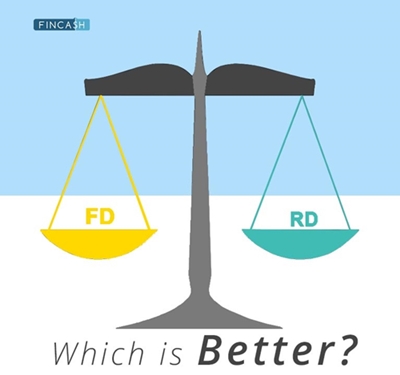Fixed Deposits vs. Savings Accounts vs. Mutual Funds: Which One Should You Choose?
Managing your hard-earned money wisely is essential, and understanding where to park your funds can make a huge difference.

Should you go for the traditional safety of Fixed Deposits (FDs), the liquidity of Savings Accounts, or the potential growth of Mutual Funds? Let’s break it down with stats, practical examples, and a clear comparison.
What Are Fixed Deposits, Savings Accounts and Mutual Funds?
Fixed Deposits (FDs)
A Fixed Deposit is a Financial Instrument offered by banks and non-banking financial companies (NBFCs) that provides a higher interest rate compared to a Savings Account. The catch? You need to lock in your money for a fixed period.
- Interest Rate: 5.5%–8% annually (varies by tenure and Bank)
- Risk Level: Low
- Liquidity: Low (penalty for premature withdrawal)
Savings Accounts
A savings account is a basic banking product that allows you to deposit money, earn modest interest, and access funds anytime.
- Interest Rate: 3%–4% annually (some banks offer up to 7%)
- Risk Level: None
- Liquidity: High
Mutual Funds
Mutual funds pool money from multiple investors and invest in stocks, Bonds, or other securities, managed by professional fund managers.
- Returns: Historically 8%–15% (varies by fund type)
- Risk Level: Medium to high (Market-linked)
- Liquidity: High for open-ended funds
Top SIP Mutual Funds in India FY 25 - 26
Fund NAV Net Assets (Cr) Min SIP Investment 3 MO (%) 6 MO (%) 1 YR (%) 3 YR (%) 5 YR (%) 2024 (%) ICICI Prudential Infrastructure Fund Growth ₹194.78
↑ 1.57 ₹8,232 100 0.5 -0.5 0 23.9 30.4 27.4 SBI PSU Fund Growth ₹33.0142
↑ 0.32 ₹5,714 500 4.4 2.9 1.5 26.2 28.5 23.5 HDFC Infrastructure Fund Growth ₹47.054
↑ 0.41 ₹2,586 300 -0.8 -0.8 -2.7 23.7 28.2 23 DSP India T.I.G.E.R Fund Growth ₹311.139
↑ 2.69 ₹5,506 500 -1.1 0.6 -8.1 23 27.6 32.4 Canara Robeco Infrastructure Growth ₹157.15
↑ 1.42 ₹936 1,000 -2.9 -1 -4.3 22.8 27.6 35.3 Nippon India Power and Infra Fund Growth ₹343.312
↑ 3.80 ₹7,530 100 -1.6 -0.1 -5.6 23.9 27.2 26.9 Bandhan Infrastructure Fund Growth ₹47.77
↑ 0.57 ₹1,625 100 -4.2 -5.3 -11.8 22.9 26.9 39.3 Franklin Build India Fund Growth ₹141.455
↑ 1.19 ₹3,088 500 -0.1 1.2 -2.1 24.1 26.8 27.8 Invesco India PSU Equity Fund Growth ₹64.24
↑ 0.61 ₹1,466 500 2 0.5 -0.2 26.5 26.8 25.6 LIC MF Infrastructure Fund Growth ₹48.7203
↑ 0.44 ₹1,054 1,000 -1.9 -1.9 -7.7 25.4 26.7 47.8 Kotak Infrastructure & Economic Reform Fund Growth ₹64.746
↑ 0.57 ₹2,425 1,000 -1.1 -0.5 -7.6 19.3 26.3 32.4 Note: Returns up to 1 year are on absolute basis & more than 1 year are on CAGR basis. as on 12 Dec 25 Research Highlights & Commentary of 11 Funds showcased
Commentary ICICI Prudential Infrastructure Fund SBI PSU Fund HDFC Infrastructure Fund DSP India T.I.G.E.R Fund Canara Robeco Infrastructure Nippon India Power and Infra Fund Bandhan Infrastructure Fund Franklin Build India Fund Invesco India PSU Equity Fund LIC MF Infrastructure Fund Kotak Infrastructure & Economic Reform Fund Point 1 Highest AUM (₹8,232 Cr). Upper mid AUM (₹5,714 Cr). Lower mid AUM (₹2,586 Cr). Upper mid AUM (₹5,506 Cr). Bottom quartile AUM (₹936 Cr). Top quartile AUM (₹7,530 Cr). Lower mid AUM (₹1,625 Cr). Upper mid AUM (₹3,088 Cr). Bottom quartile AUM (₹1,466 Cr). Bottom quartile AUM (₹1,054 Cr). Lower mid AUM (₹2,425 Cr). Point 2 Established history (20+ yrs). Established history (15+ yrs). Established history (17+ yrs). Established history (21+ yrs). Established history (20+ yrs). Oldest track record among peers (21 yrs). Established history (14+ yrs). Established history (16+ yrs). Established history (16+ yrs). Established history (17+ yrs). Established history (17+ yrs). Point 3 Rating: 3★ (lower mid). Rating: 2★ (bottom quartile). Rating: 3★ (lower mid). Rating: 4★ (upper mid). Not Rated. Rating: 4★ (upper mid). Rating: 5★ (top quartile). Top rated. Rating: 3★ (lower mid). Not Rated. Rating: 4★ (upper mid). Point 4 Risk profile: High. Risk profile: High. Risk profile: High. Risk profile: High. Risk profile: High. Risk profile: High. Risk profile: High. Risk profile: High. Risk profile: High. Risk profile: High. Risk profile: High. Point 5 5Y return: 30.41% (top quartile). 5Y return: 28.52% (top quartile). 5Y return: 28.19% (upper mid). 5Y return: 27.61% (upper mid). 5Y return: 27.60% (upper mid). 5Y return: 27.22% (lower mid). 5Y return: 26.88% (lower mid). 5Y return: 26.83% (lower mid). 5Y return: 26.77% (bottom quartile). 5Y return: 26.72% (bottom quartile). 5Y return: 26.30% (bottom quartile). Point 6 3Y return: 23.91% (lower mid). 3Y return: 26.25% (top quartile). 3Y return: 23.71% (lower mid). 3Y return: 23.05% (lower mid). 3Y return: 22.75% (bottom quartile). 3Y return: 23.92% (upper mid). 3Y return: 22.88% (bottom quartile). 3Y return: 24.14% (upper mid). 3Y return: 26.53% (top quartile). 3Y return: 25.35% (upper mid). 3Y return: 19.30% (bottom quartile). Point 7 1Y return: -0.03% (top quartile). 1Y return: 1.51% (top quartile). 1Y return: -2.68% (upper mid). 1Y return: -8.10% (bottom quartile). 1Y return: -4.31% (lower mid). 1Y return: -5.56% (lower mid). 1Y return: -11.77% (bottom quartile). 1Y return: -2.15% (upper mid). 1Y return: -0.23% (upper mid). 1Y return: -7.68% (bottom quartile). 1Y return: -7.60% (lower mid). Point 8 Alpha: 0.00 (top quartile). Alpha: -0.58 (lower mid). Alpha: 0.00 (top quartile). Alpha: 0.00 (upper mid). Alpha: 0.00 (upper mid). Alpha: -7.46 (bottom quartile). Alpha: 0.00 (upper mid). Alpha: 0.00 (lower mid). Alpha: -0.54 (lower mid). Alpha: -6.32 (bottom quartile). Alpha: -8.58 (bottom quartile). Point 9 Sharpe: 0.00 (upper mid). Sharpe: 0.09 (top quartile). Sharpe: -0.15 (bottom quartile). Sharpe: -0.33 (bottom quartile). Sharpe: -0.02 (upper mid). Sharpe: -0.12 (lower mid). Sharpe: -0.31 (bottom quartile). Sharpe: -0.11 (lower mid). Sharpe: 0.09 (top quartile). Sharpe: -0.04 (upper mid). Sharpe: -0.14 (lower mid). Point 10 Information ratio: 0.00 (lower mid). Information ratio: -0.57 (bottom quartile). Information ratio: 0.00 (upper mid). Information ratio: 0.00 (upper mid). Information ratio: 0.00 (upper mid). Information ratio: 0.57 (top quartile). Information ratio: 0.00 (lower mid). Information ratio: 0.00 (lower mid). Information ratio: -0.60 (bottom quartile). Information ratio: 0.40 (top quartile). Information ratio: -0.11 (bottom quartile). ICICI Prudential Infrastructure Fund
SBI PSU Fund
HDFC Infrastructure Fund
DSP India T.I.G.E.R Fund
Canara Robeco Infrastructure
Nippon India Power and Infra Fund
Bandhan Infrastructure Fund
Franklin Build India Fund
Invesco India PSU Equity Fund
LIC MF Infrastructure Fund
Kotak Infrastructure & Economic Reform Fund
200 Crore in Equity Category of mutual funds ordered based on 5 year calendar year returns.
How Do They Compare?
| Feature | Fixed Deposits | Savings Accounts | Mutual Funds |
|---|---|---|---|
| Returns | Moderate (5.5%–8%) | Low (3%–4%) | High (8%–15%) |
| Risk | None | None | Medium to High |
| Liquidity | Low | High | High (varies) |
| Tax Benefits | Available (5-year lock-in for 80c) | None | Equity-linked funds offer benefits |
| Ideal | For Safety, Fixed Goals | Emergency Funds | Wealth Growth |
Practical Examples
Example 1: Fixed Deposit for Stability
Arjun, a 50-year-old, wants to park ₹5,00,000 safely for 5 years.
Choice: He opts for a fixed deposit with a bank Offering 7% interest Returns: After 5 years, Arjun earns approximately ₹7,00,000 (compounded annually)
Why? He prioritises safety over high returns.
Example 2: Savings Account for Emergencies
Neha, a working professional, keeps ₹1,00,000 in her savings account to cover unforeseen expenses.
Choice: Her bank offers 4% interest Returns: Over a year, she earns ₹4,000 as interest
Why? She values liquidity and immediate access to her funds.
Example 3: Mutual Funds for Growth
Ravi, a 30-year-old IT professional, invests ₹10,000 monthly in an Equity Mutual Fund SIP for 10 years.
Choice: The fund averages a 12% annual return Returns: Ravi accumulates over ₹23 lakhs (approx.) due to the Power of Compounding
Why? He aims for long-term wealth creation.
Impact of Inflation on Your Choices
Savings Accounts: Often Fail to beat Inflation, eroding the real value of your money over time Fixed Deposits: Provide slightly better protection against inflation but may still fall short during high-inflation periods Mutual Funds: Equity mutual funds have the potential to generate inflation-beating returns over the long term
Talk to our investment specialist
What Do the Stats Say?
- Fixed Deposits: According to RBI, the average term deposit interest rate in India hovers between 5%–7%.
- Savings Accounts: The Indian banking sector reports that over 70% of adults maintain a savings account, with limited returns but high liquidity.
- Mutual Funds: AMFI data shows mutual fund AUM (Assets Under Management) grew at a CAGR of 14.2% between 2013 and 2023, reflecting increasing investor interest.
Who Should Choose What?
Choose Fixed Deposits If:
- You want stable returns
- You can lock your funds for a specific period
- You prefer no risk to your Capital
Choose Savings Accounts If:
- You need frequent access to funds
- You’re building an emergency corpus
- You value convenience over returns
Choose Mutual Funds If:
- You want higher returns over the long term
- You can tolerate some risk
- You aim to beat inflation and grow wealth
Tax Implications
Fixed Deposits: Interest Income is fully taxable as per your income tax slab.
Savings Accounts: Interest up to ₹10,000 (₹50,000 for senior citizens) is exempt under Section 80TTA/80TTB.
Mutual Funds:
- Short-term Capital Gains tax (15%) on Equity Funds held for less than a year.
- Long-term capital gains tax (10%) for equity gains above ₹1 lakh.
Highlighting the tax advantages of mutual funds, especially ELSS funds, can attract readers looking for tax-saving investments.
Key Takeaways
- FDs are ideal for conservative investors
- Savings accounts are a must for liquidity and emergency funds
- Mutual funds suit long-term investors aiming for wealth creation
Conclusion: Diversify Wisely
There’s no one-size-fits-all solution. A balanced approach could be allocating your funds as:
- 50% in FDs for stability
- 30% in Savings for emergencies
- 20% in Mutual Funds for growth
This way, you get the best of all worlds—stability, liquidity, and growth! Always assess your Financial goals, risk tolerance, and time horizon before making a decision.
FAQs
1: Are mutual funds riskier than FDs?
A: Yes, mutual funds are market-linked and come with higher risks, but they also have the potential for higher returns.
2: Can I break my FD before maturity?
A: Yes, but a penalty is usually charged.
3: Are mutual funds tax-free?
A: Equity mutual funds held for more than one year attract long-term capital gains tax (10% on gains over ₹1 lakh).
4: How much emergency fund should I keep in a savings account?
A: Ideally, 3–6 months of your monthly expenses.
Start managing your money smartly today! Which one will you pick? Share your thoughts in the comments below.
All efforts have been made to ensure the information provided here is accurate. However, no guarantees are made regarding correctness of data. Please verify with scheme information document before making any investment.







